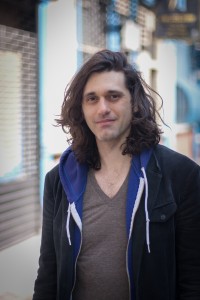
Pictured: Lucas Hnath. Photo by Caleb Savage, NYU Local
In preparation for the Midwest premiere of Isaac’s Eye, Literary Manager Bobby Kennedy discussed with playwright Lucas Hnath his inspiration for the play and fresh approaches to storytelling.
Bobby Kennedy: Where did the idea of writing a play about Isaac Newton come from? Is he a subject you’ve always been fascinated by or was there a particular moment in which the idea came to you?
Lucas Hnath: No, I initially had no particular interest in Newton. I had a prior interest in eyes—-a recurring image from past plays that involved some kind of violence being inflicted on eyeballs. I heard an interview on the radio in which a writer briefly described the story of Newton prodding his eye with a needle, and I thought that it sounded like something I would write about.
But of course, the image of the eyeball is really about seeing and knowing and the tension between those two things. If you were to dump all of my plays into one file and analyze the frequency with which certain words occur, at the top of the list you would find the word “know.” My plays—and Isaac’s Eye is no exception— seem to orbit around the question, “How do we know what we know?”
BK: You have said elsewhere that you practice “messy research” when writing a work of fiction about a historical subject. What do you mean by that? Why is it important to you to free your writing from the confines of historical fact?
Hnath: By “messy” I mean that the research is haphazard and interspersed with the actual writing process. I tend to skim a lot when I read books as research. I’m not necessarily trying to free myself from historical fact; I’m just trying to find a stage-worthy story. For me it’s necessary to consume a lot of fragments rather than coherent, whole statements; with all those fragments floating in my brain, I’m much quicker to piece them into a dramatically cohesive narrative. I’m really tricking my brain into seeing a story that fits on stage.
BK: And wasn’t it in response to some early concerns about the factual accuracy of Isaac’s Eye that you came up with the theatrical device of writing the “truths” on the wall of the theatre? Can you tell us more about that?
Hnath: Some very thoughtful powers-that-be were somewhat concerned that the play they had commissioned me to write was going to misinform the public about Isaac Newton and his antagonist, Robert Hooke. I felt conflicted about their concern: on one part I understood where they were coming from, but I also knew that slavish adherence to the hard facts would have compromised the semi-Aristotelian dramatic form that I envisioned for the play. So, I decided that the most honest thing I could do is put the conflict I was experiencing inside my head on the stage. It worked out nicely that Newton was also accused of doing the very kind of “fudging-of- the-truth” that I was committing in my storytelling; the conflict echoes throughout the entire play.
BK: Despite the presence of characters from the 17th century, the language and style of your play are effortlessly contemporary. What interests you about that juxtaposition?
Hnath: I just didn’t understand why the play needed to be performed with period dressing. We know when it’s taking place; we can keep that in mind as we watch; adding extra clothes and accents and “appropriate language” doesn’t enhance the story in any way, so I didn’t add it.
On a related note, I remember listening to a recording of Brecht’s Galileo. It was recorded in America and starred all American actors, and yet, for some inexplicable reason the actors were speaking in vaguely English accents. I’m not sure why; Galileo wasn’t British. The actors were monumentalizing the character —rendering the play in the performative equivalent of marble. You see it all the time in productions of classics. This kind of fussiness simply “others” the character and the play’s subject. I’m interested in eliminating the distance barrier.
BK: I have also heard that Isaac’s Eye is a very autobiographical play for you. What makes it so personal?
Hnath: Oh, I might have been being provocative for provocative’s sake when I said that. Certainly the play gives voice to concerns I have about my own ambitious qualities. Sure, in many respects it is an intensely autobiographical play but in none of the obvious ways; I take details of my life and of Newton’s that seem to echo each other, and I put them in a blender. But I’d imagine anyone who tries to make a guess of where I am in the play would probably guess incorrectly. Everything’s all flipped and rearranged and inverted.
More on Isaac’s Eye:
Articles | Videos | Production Details | Tickets


No comments yet.